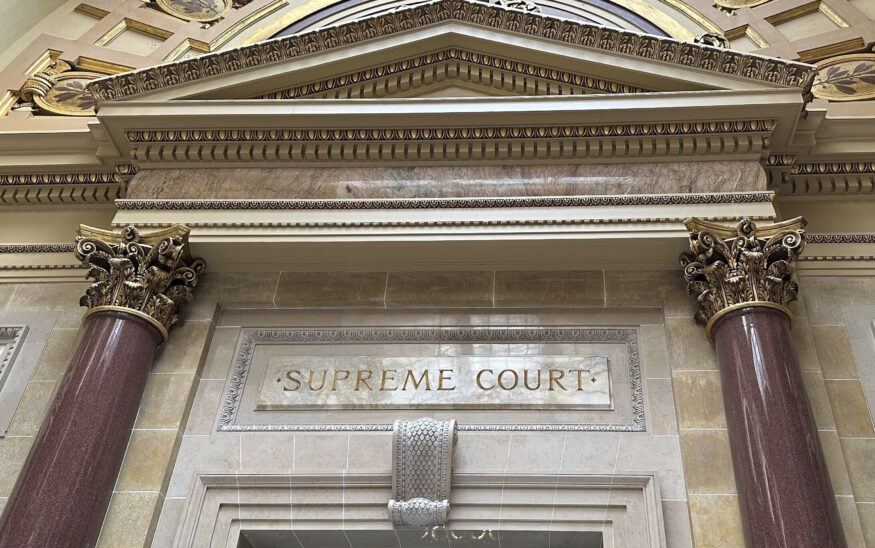Racine voting vehicle case to be reviewed by Wisconsin Supreme Court
By: Julie Lang//May 29, 2024//
A Wisconsin Court of Appeals case involving a Racine voting vehicle, or “Mobile Voting Unit (MEU),” was recently accepted by the Wisconsin Supreme Court for review.
As previously reported by the Wisconsin Law Journal, at its April 16 conference, the Wisconsin Supreme Court voted to accept two new cases and deny the review of dozens of other cases. The Court receives approximately 1,000 petitions for review and approximately 20-30 petitions for bypass but it agrees to hear about one-tenth of these cases during each term.
Brown v. WEC
On May 3, 2024, the Wisconsin Supreme Court announced that it had granted two petitions to bypass the Court of Appeals in the case of Brown v. WEC.
One petition was filed by Black Leaders Organizing for Communities (BLOC) with separate joinders to BLOC’s petition filed by Tara McMenamin and the Democratic National Committee. The second petition was filed by the Wisconsin Elections Commission.
The Court also noted in its order that subsequent to the filing of the petitions, Kenneth Brown filed a notice of cross-appeal from the final judgment of the Racine County Circuit Court which ruled against him in three of his five claims. In his cross-appeal, Brown is asking the Wisconsin Supreme Court to determine, “Whether the circuit court erroneously interpreted Wis. Stat. § 6.855 with respect to the use of alternate absentee voting sites including when they may be used, where they may be located, and their availability throughout the election period.”
Also in its order, the Wisconsin Supreme Court stated that it assumes jurisdiction over the entire matter, including the issues raised in Brown’s cross-appeal.
The Wisconsin Legislature passed an amendment to Wis. Stat. § 6.855 in response to a 2016 federal court which ruled that limiting municipalities to just one voting site was unconstitutional. The amendment permits municipalities to designate multiple, alternate voting sites for in-person absentee voting under certain conditions.
The day after the August 2022 primary election, Brown, a registered Wisconsin voter who resides in the City of Racine, filed an administrative complaint with the Wisconsin Elections Commission against McMenamin, the City Clerk of the City of Racine, alleging that she had violated Wis. Stat. § 6.855 by allowing voters to either cast absentee ballots at City Hall or at any of the multiple, alternative in-person absentee voting sites. For the primary election, the City of Racine parked the MEU vehicle—which contained voting equipment and other necessities for voters to cast their votes—at sites designated for alternate in-person absentee voting.
Brown also alleged in his complaint that a majority of the alternative sites McMenamin selected, out of the approximately 150 sites previously approved by the City of Racine Common Council, had afforded an advantage to citizens who belong to the Democratic party or vote Democratic.
The Wisconsin Elections Commission found no violation of the law and dismissed his complaint. Represented by Wisconsin Institute of Law & Liberty, Brown quickly appealed the decision to the Racine County Circuit Court.
In January of this year, Circuit Court Judge Eugene Gasiorkiewicz was assigned to the case after Judge Mark Nielsen experienced health issues and retired.
Gasiorkiewicz ruled in favor of Brown in two of his five claims. The BLOC petitioners are asking the Wisconsin Supreme Court to review those two issues: specifically, whether the Circuit Court improperly construed the “partisan advantage” language of Wis. Stat. § 6.855 and if it improperly applied Wis. Stat. § 6.84 to prohibit the City of Racine’s MEU under Wis. Stat. § 6.855.
The Circuit Court held that Brown has standing based on Teigen v. WEC but in its petition, the Wisconsin Elections Commission is asking the Court to determine if Brown was “aggrieved” under Wisconsin law since, “The plaintiff asserted that he is a voter who wants to see the law followed. He did not assert that his ability to vote had been injured or that he belongs to a political party that was injured.”
The Commission is also questioning whether the Circuit Court correctly interpreted the statute when it “held that Racine erred in establishing such sites for the August 2022 primary election because its sites were located in wards with different Democratic/Republican voting results than the ward where the city clerk’s office is located.”
The Wisconsin Supreme Court further ordered that briefings were to be filed, starting June 3, 2024, and that oral arguments in the case will be scheduled in a future order for the fall of 2024.
Morway v. Morway
The Wisconsin Supreme Court also granted the petition for review filed by David Morway, which is asking the Court to reverse a Court of Appeals order and determine issues related to attorney’s fees and the “finality language” in court orders for purposes of appeal.
After his divorce from Karen Morway, David filed two motions to modify maintenance in light of his reduced income. A family court commissioner held a trial, found a substantial change in circumstances and greatly reduced his monthly payments.
Karen appealed and a de novo trial was held in early 2023. In the post-trial briefing, she sought an award of attorney fees “as an innocent party who is the victim of overtrial.” She also argued that her motion to compel had been granted by the family court commissioner and the order mandated an award of attorney’s fees, which David disputes.
On April 19, 2023, the Ozaukee County Circuit Court rendered an oral decision on the motion to modify maintenance and although it found that David was not “shirking,” it imputed his annual income and awarded maintenance to Karen, retroactive to the previous year.
At a post-trial hearing, the Circuit Court found that no overtrial occurred in the trial but it could not determine if it occurred prior to trial so in its ensuing May 24, 2023 order, it confirmed that litigation would continue with Karen filing a motion on the issue. David argues in his petition to the Wisconsin Supreme Court that, “The Order did not include any language stating it was final for purposes of appeal pursuant to Wambolt v. West Bend Mut. Ins. Co.”
David appealed the May 24, 2023 order and all subsequent orders by the Court of Appeals, stating that: “On November 17, 2023, the Court of Appeals issued an order finding the May 24, 2023 Order was in fact a ‘final order’ that disposed of ‘the entire matter in litigation,’ despite the lack of finality language and despite the language expressly contemplating further substantive litigation as to whether overtrial occurred.”
The granted issues presented for review are as follows:
- The Court of Appeals held the May 24, 2023 Order was a final order because the motion for overtrial had not been filed at the time the Order was entered. Is an order that includes no finality language and that expressly contemplates additional substantive litigation between the parties a “final order” under Stat. § 808.03for purposes of appeal?
- The Court of Appeals held the May 24, 2023 Order was final “even though the post-judgment attorney’s fees motions were not resolved by the motion,” citing Campbell v. Campbell. Is there an attorney fee exception to finality under Wis. Stat. § 808.03, such that an order is final for purposes of appeal if all that remains to be litigated is a claim for attorney’s fees?
- This was not addressed by the lower courts: If an attorney fee exception exists, does it extend to fee claims that require additional substantive litigation between the parties?
Legal News
- Milwaukee drops security personnel ordinance
- Wisconsin Supreme Court tacks on addition months to already suspended lawyer
- Supreme Court: Abortion protester’s First Amendment rights violated
- These doctors were censured. Wisconsin’s prisons hired them anyway
- Ruling reinstates lawsuit over ‘Black Lives Matter’ school posters
- Wisconsin Supreme Court to consider whether 175-year-old law bans abortion
- Wisconsin man facing bestiality and felony bail jumping charges
- Waukesha County woman indicted in National Health Care Fraud Law Enforcement Action
- Man sentenced to 15 months for fraud involving luxury vehicles
- Wisconsin Department of Justice Fire Marshal investigating fire that killed six
- Ozaukee County first responders save family of three, father and son on Milwaukee River
- Supreme Court sends Trump immunity case back to lower court, dimming chance of trial before election
Case Digests
- Termination of Parental Rights
- First Amendment Rights
- Termination of Parental Rights
- Late Filing
- Real Estate-Attorney Fees
- Ineffective Assistance of Counsel
- Variance-Interpretation of Zoning Ordinances
- Sentencing
- Fourteenth Amendment’s Due Process Clause-Jury Instructions
- Unlawful Collection Practices-Evidence
- Sentencing-Vindictiveness
- Prisoner Grievances-Exhaustion of Administrative Remedies












